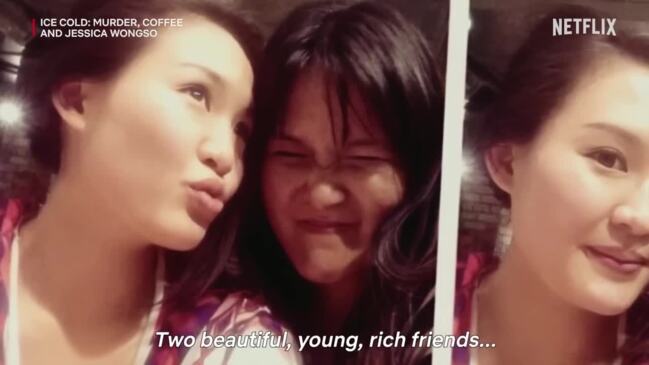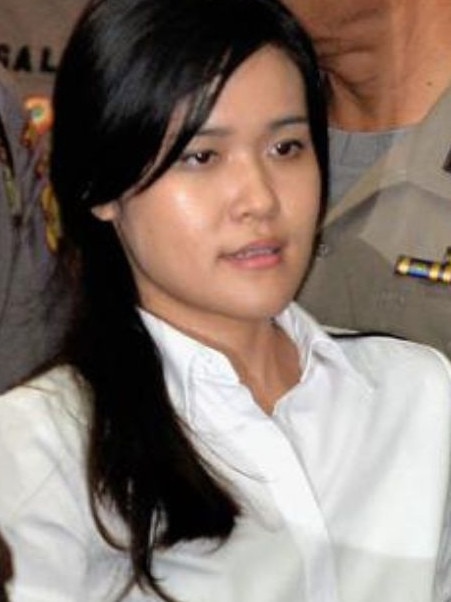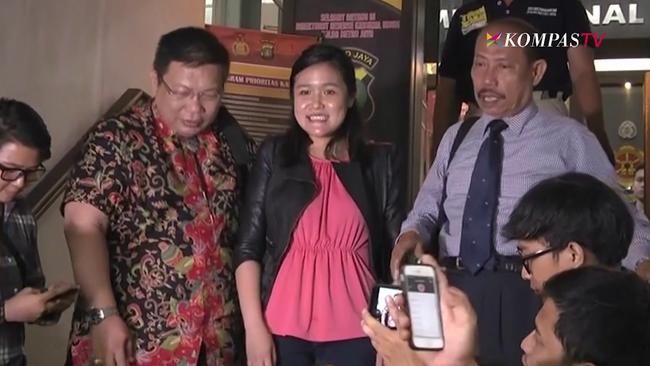‘Iced coffee murderer’ Jessica Wongso released on parole in Indonesia
Aussie resident Jessica Wongso has been sensationally released from prison after serving a fraction of a 20-year sentence for her friend’s murder.

World
Don't miss out on the headlines from World. Followed categories will be added to My News.
Australian permanent resident Jessica Kumala Wongso was sensationally released from prison after serving just eight years of a 20 year sentence for the murder of her friend Wayan Mirna Salihin.
Indonesian national Wongso was found guilty of murdering Ms Salihin, 27, in 2016 after a five-month trial in the country’s capital Jakarta. A panel of judges found she had spiked her friend’s Vietnamese iced coffee with the lethal poison cyanide, causing her death.
Wongso left Pondok Bambu Women’s Prison in East Jakarta on Sunday morning with her lawyer Otto Hasibuan, and told reporters and spectators that she was looking forward to “sushi and fresh drinks” to celebrate her release on parole.
“Praise be to God. We are surprised [by her release] as well because she was supposed to serve 20 years,” Mr Hasibuan said.
Under Indonesian law, Wongso was eligible for parole having served two thirds of her sentence, and had received 58 months remission time for good behaviour while in prison. She will remain on parole until March 2032, and must regularly report to the Indonesian police to comply with the conditions of her release.


While she may now be a free woman, Wongso’s defence team said it will continue to pursue a judicial review in the hope of overturning Wongso’s murder conviction.
“The plan for a judicial review is still in place, and we will file the petition next week,” lawyer Hidayat Bostam said.
Ms Salihin collapsed and died in an upscale cafe in Jakarta after drinking part of the Vietnamese iced coffee bought for her by Wongso, who has always maintained her innocence. At her trial, the prosecution claimed that Wongso was jealous of Ms Salihin, who had recently married.
In September last year, Netflix released the documentary Ice Cold: Murder, Coffee and Jessica Wongso, which prompted renewed interest in the case and questions about Wongso’s guilt.
A source close to Wongso’s family told news.com.au they were pleased that she had been freed, but that she should have been released sooner.
“There were so many factors that were wrong with this case, one of which was that there was not enough evidence to support a murder conviction, but the authorities forced it through the courts anyway,” the source said, speaking on condition of anonymity due to the sensitive nature of the case and the fact Wongso is on parole.
“Fortunately [Wongso’s lawyer] Otto [Hasibuan] and his team always believed that Jessica was innocent. But that is how law enforcement works in Indonesia.
“What is wrong can be right, what is right can be wrong,” the source said.

Wongso and Ms Salihin studied together at the Billy Blue Design College in Sydney before Wongso went to work as a graphic designer for NSW Ambulance. She was 27 when she returned to her native Indonesia for a holiday, during which time she met with Ms Salihin on that fateful day at the Olivier Cafe in the glitzy Plaza Indonesia.
Professor of Indonesian Law at the University of Sydney Law School Simon Butt told news.com.au “the cause of the victim’s death was never credibly established”.
“Wongso was found guilty of murder, but it was never established whether Salihin died of cyanide poisoning, as alleged, leaving it quite possible that the victim died of natural causes,” Prof Butt said.
“There were also significant problems with the chain of custody of the evidence, and with the testing of the coffee for cyanide.
“Despite the allegation being that Wongso administered the cyanide in the cafe, no one saw her do it, no traces of cyanide were found on her and the best the prosecution could do was show footage of her making some movements behind some large shopping bags,” he said.
Hes said defence claimed the movements were actually Wongso texting on her phone.
During Wongso’s trial in 2016, three experts from Australia testified they did not believe Ms Salihin had died from cyanide poisoning.
Dr Oktavinda Safitry, a forensic doctor at Indonesia University Hospital, told news.com.au that in cases of suspected poisoning, an autopsy is carried out to see any abnormalities in the organs, whether there is an underlying disease present, and to look for the mechanism of death.

Samples are usually then taken from blood, urine and organs to find out the type of poison that is suspected to be the cause of death.
“If the type of poison has been found, the level needs to be checked to find out whether it is a fatal dose that is ‘worthy’ of being the cause of death,” Dr Safitry said.
“The severity of cyanide poisoning depends on the type of cyanide and the form of cyanide too, whether it was an inhaled gas, swallowed, or exposed to the skin, because cyanide also exists in nature, like in cigarettes,” she said.
“In cases of suspected poisoning, the cause of death is determined based on the results of macroscopic and microscopic examination of organs. To obtain maximum toxicological examination samples, blood, urine, organs are taken immediately before cell damage occurs due to the decay process.”
As detailed in the Netflix documentary, Ms Salihin’s body was only partially autopsied, and samples taken 70 minutes after her death found no traces of cyanide in her system.
A lethal dose of cyanide is between 50 and 176mg, and only 0.2mg of cyanide was found in samples taken from Ms Salihin’s body three days after her death, according to the documentary.
Prof Butt said he did not know whether the Netflix documentary had influenced the decision to release Wongso on parole, but that there were “a lot of things that did not add up about the trial”.
“Putting aside the question of whether she did it or not, and I don’t know the answer to that, I don’t think she got a fair trial,” he said.
Aisyah Llewellyn is a freelance journalist based in Indonesia
Originally published as ‘Iced coffee murderer’ Jessica Wongso released on parole in Indonesia




